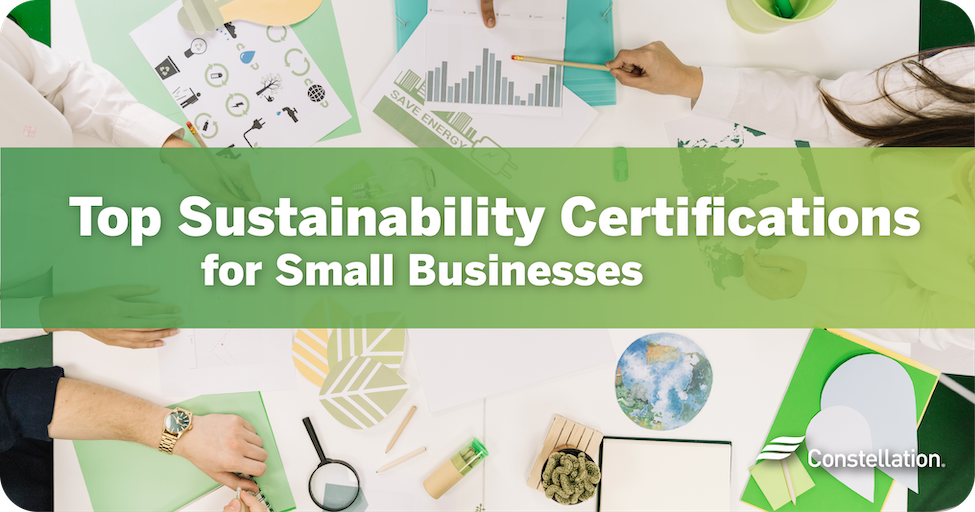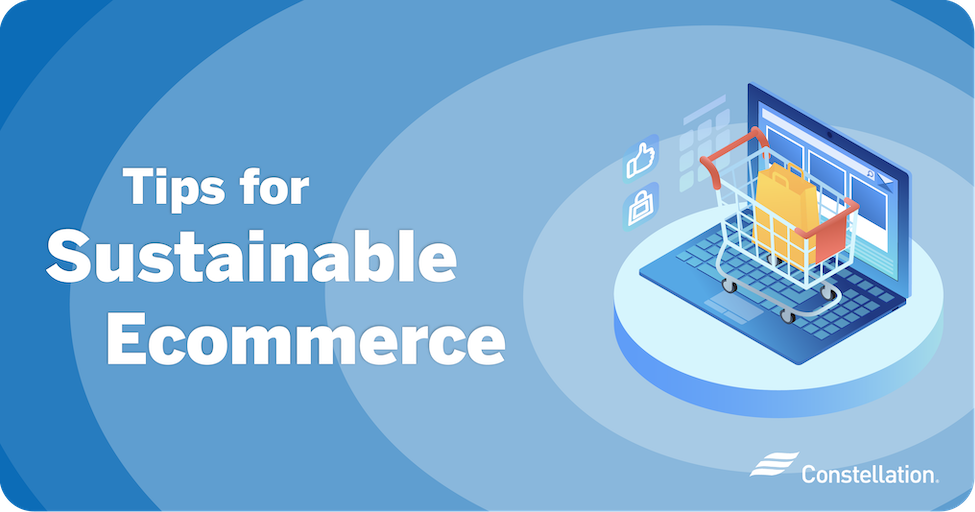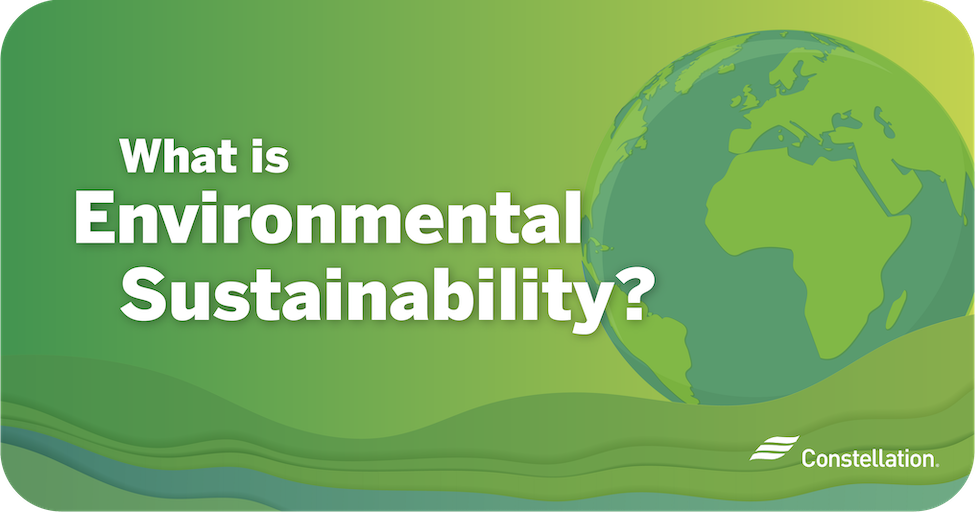
- Category:
Small Business Energy Savings -
Last updated:
June 3, 2025
What Is Environmental Sustainability?
Environmental sustainability is a phrase that gets used often, but not everyone fully understands what it entails. So, what does environmental sustainability really mean? In this post, we’ll take a deeper dive into the concept, explore how it’s influencing decisions and investments, and what it looks like in practice for small businesses.
From adopting greener operations to meeting new expectations through environmental, social and governance (ESG) reporting, sustainability is becoming central to how businesses plan for the future. ESG reporting allows businesses to track and share their performance on key sustainability metrics, such as carbon emissions, energy use and waste reduction, as well as other social and governance factors.
While some reporting is now required by regulators, many companies are adopting ESG frameworks voluntarily to increase transparency, build trust with stakeholders and future-proof their operations. Understanding what environmental sustainability means in this context is crucial, especially for small businesses navigating growing expectations and new opportunities.
Jump to section:
- Environmental sustainability defined
- Why environmental sustainability is important in business
- Examples of environmental sustainability
- How can businesses become more sustainable?
- Benefits of environmental sustainability for businesses
Environmental sustainability definition
Environmental sustainability is making responsible choices in today’s activities and resource usage so that we don’t deplete them, preserving them for future generations and also protecting the environment against degradation.
For your small business, environmental sustainability means operating in a way that minimizes your impact on the environment. The EPA develops regulations and standards for environmental sustainability that address how we protect the environment and preserve resources.
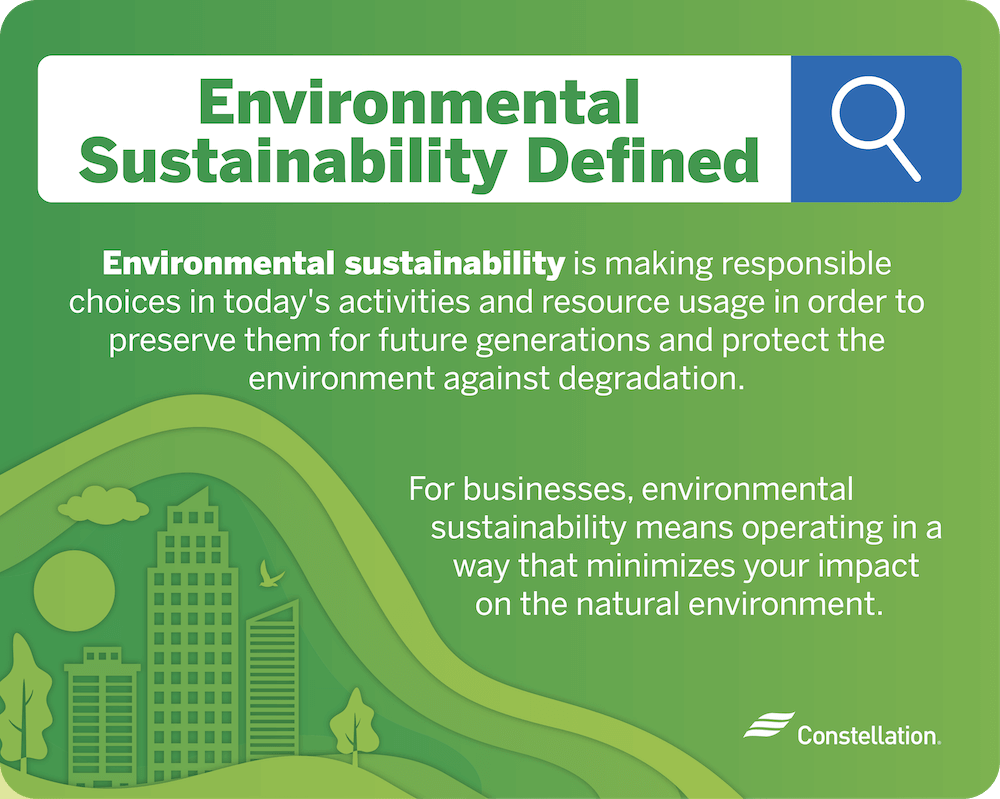
The three types of sustainability
Sustainability can be a bit abstract, so it’s helpful to break it down into three aspects that give you a framework for developing solutions and making decisions in your business:
- Social sustainability: The impact your business has on the people in your community.
- Economic sustainability: To promote growth and prosperity without damaging the environment or the community, especially by favoring long-term economic benefits.
- Environmental sustainability: Aims to preserve natural resources, particularly non-renewable ones, and natural ecosystems.
Why is environmental sustainability important in business?
With this environmental sustainability definition, you may be wondering what environmental sustainability means for your business. While caring for the environment is good for you, your employees, and your customers, what are the other impacts?
You can reduce your operating expenses by being more efficient with resources. Secondly, you can raise the profile of your business and enhance its reputation by being a leader in supporting environmental sustainability. The reasons why environmental sustainability is important in business are many, so it’s worth looking at ways your business can contribute.
10 examples of environmental sustainability
These examples of environmental sustainability can give you ideas for your own business. Many of these ideas are easy to implement and all are well worth the effort involved.
1. Using renewable energy
Topping the list of business sustainability examples is your source of energy. Business energy use is one of the largest contributors to greenhouse gases. Switching from carbon-based energy to renewable options is a big step towards making your business more environmentally sustainable. Adding solar to your facility or signing a clean energy contract with your power provider is an easy way to reduce your carbon footprint.
2. Limiting waste and pollution
Business waste does more than clog landfills; transporting and processing it uses energy. Many items, particularly electronics and light bulbs, also create toxic pollution. Going paperless can reduce bulk waste and clutter. Recycle light bulbs to harvest valuable materials and prevent toxins from entering the environment.
You can also recycle old office equipment or donate it to charities to reduce the waste you send to landfills and prevent pollution. Many municipalities regularly schedule days when you can drop off waste like light bulbs, old computers, monitors and phones.
3. Conserving water
Saving water protects a vital natural resource and saves the energy needed to purify and pump it to your facilities. Dealing with sewage and other waste consumes energy and creates waste that must be processed.
Your small business can do its part following water saving tips like fixing leaks, using water efficient fixtures and appliances, and even reusing water when possible. Get employees involved with office etiquette signs that suggest ways to save water and energy. Small steps add up to contribute to environmental sustainability.
4. Using energy-efficient office equipment
Other environmental sustainability examples include switching to energy-efficient office equipment. Computers, printers, scanners and monitors with ENERGY STAR® ratings can slash your energy demand.
In addition, plug devices into surge protectors that make it easy to turn them off when not in use and consider adding smart office technology to optimize how you use your office equipment.
5. Installing high-efficiency light bulbs
Incandescent light bulbs are notoriously inefficient. To get 800 lumens, they use 60 watts of electricity. The same amount of light from a CFL bulb is 13–16 watts, and an LED bulb will use just 8–13 watts.
Switching light bulbs is an example of a business sustainability step that doesn’t take a big effort or budget. Before switching, learn more about types of bulbs, compare LED vs. CFL bulbs and choose the best commercial lighting for your facilities.
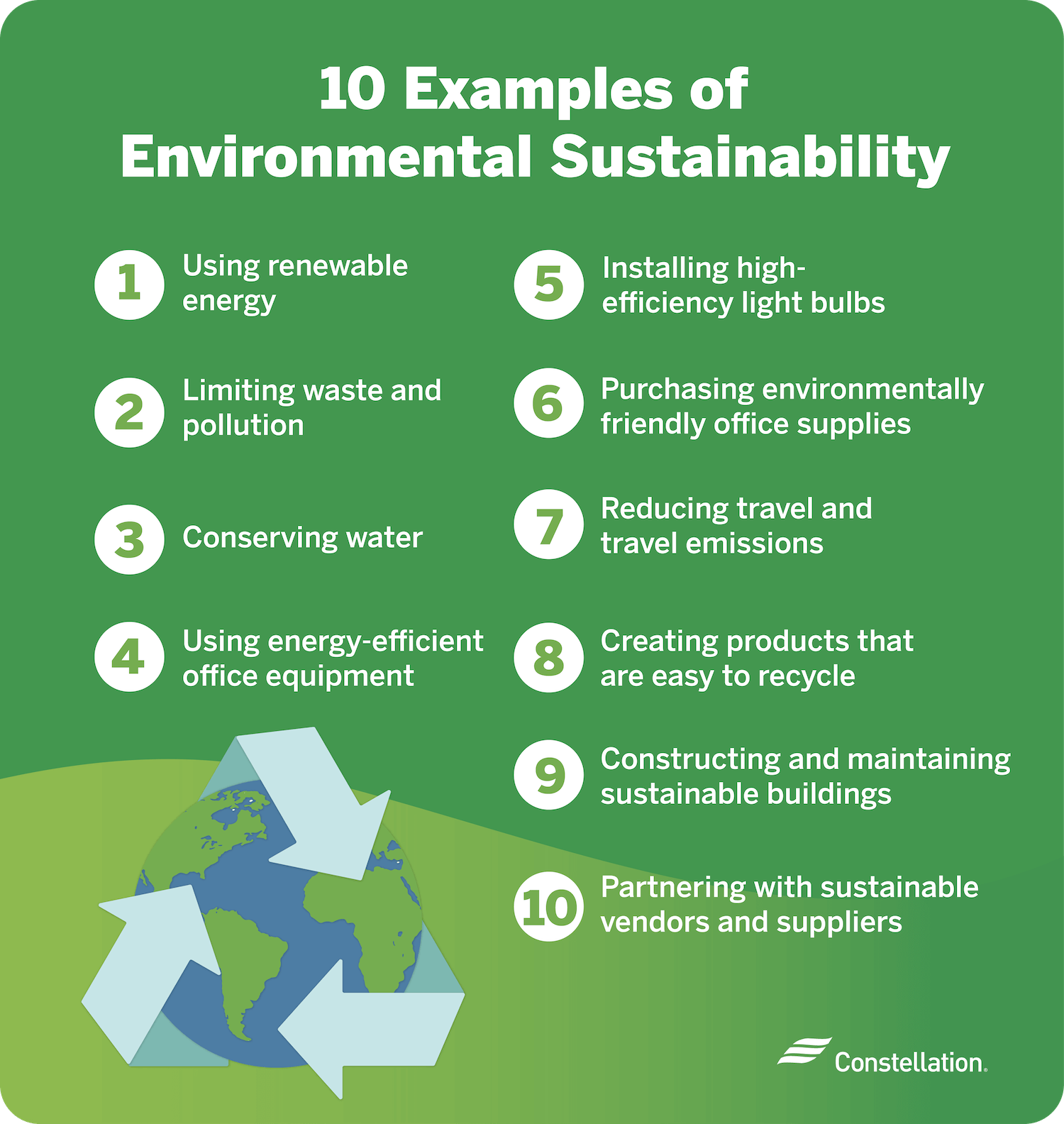
6. Purchasing environmentally friendly office supplies
The resources your business uses add up, even for what you might think are small things. Office supplies fall into this category because you use so many of them. Think about what you buy across their whole lifecycle, then:
- Choose supplies made from recycled and biodegradable materials without toxic chemicals.
- Look for minimal packaging that can be recycled.
- Buy products that last instead of disposables and products that can be recycled after use.
7. Reducing travel and travel emissions
If you can take more meetings online, you can reduce your travel expenses and the carbon footprint that comes with hopping in a car or boarding a plane. Examine past travel expenses and reasons for making trips to see what kinds of travel you can reduce in your business.
Commuting also has an enormous impact on energy usage. Your business can offer commuter benefits and incentives for ride-sharing, using public transportation or even bicycles. Adding an electric car charging station at your business can encourage employees to choose this option.
8. Creating products that are easy to recycle
Helping your customers reduce waste is another way to make your business environmentally sustainable. From carefully sourcing materials to designing packaging that is easy to recycle, you and your customers can team up to help the environment. Whatever approaches you use, be sure to communicate clearly and often so that people know what to do and can also appreciate your efforts.
9. Constructing and maintaining sustainable buildings
Your business buildings are another place to look for ways to contribute to environmental sustainability. When making renovations like replacing a roof, consider cool roofs that reduce your need for air conditioning. New windows can dramatically cut your heating and air conditioning bills.
You can also add smart features to automate your building to save energy. The U.S. Green Building Council offers advice when it comes to planning, design, tearing down and building new, as well as operations inside buildings. Their guidelines will help you reduce energy and water use through selecting the right materials, systems and construction methods.
10. Partnering with sustainable vendors and suppliers
Consider the indirect environmental impact of your vendors and suppliers. Environmental sustainability of businesses ultimately requires choosing companies that work with you for the betterment of the community and the environment.
Prioritize relationships with companies that are committed to low-emission manufacturing and shipping, and to ethical sourcing, recycling and waste minimization. The goal is a supply chain with environmental sustainability built into every step.
How can small businesses become environmentally sustainable?
You can start implementing environmentally friendly practices into your daily operations.
Before you do anything, conduct a small business energy audit. It will help you benchmark a starting point and give you ideas about where to invest time, money and effort. Developing a small business sustainability plan will help you set up resources and map out a path for achieving your goals. You can also engage customers in sustainability efforts to boost their awareness of your commitment and what your company achieves.
The benefits of environmental sustainability for businesses
Environmental sustainability brings real benefits to your company:
- Saves energy and budget: Saving energy is saving on your budget, reducing your operating expenses.
- Limits waste: Waste costs money and hurts the environment. Your business can operate with higher productivity through careful use of resources.
- Reduces pollution and emissions: Saving energy, reducing waste and being mindful of operations all have a direct impact on the environment.
- Helps improve brand image: Customers increasingly expect companies to care about the environment.
- Attracts and retains good employees: People want to work for a company that cares about the future and the community.
- Future-proofs your company: Changes you make now set you up to easily comply with future environmental regulations and resource limits, creating a resilient business.
- Strengthens your supply chain: With collaborative relationships, you can work more closely and openly with vendors and suppliers.
Environmental sustainability makes good business sense. Taking steps to protect the environment and preserve resources pays off in improving efficiency and profitability, strengthening your brand and customer relationships and ensuring your business is resilient to thrive in a changing future.
